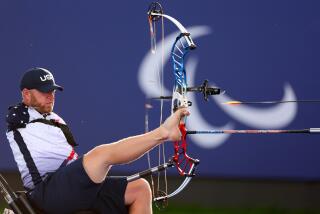Winding trajectory
- Share via
When Khatuna Lorig begins to train for the 2012 Olympics in London, she hopes to be training side by side with her husband, fellow archer Archil Onashvili.
That would beat every training experience she’s had. It would be better than when she was pregnant leading up to and during the 1992 Olympics in Barcelona, surpass training by candlelight in 1996, and beat practicing while she was a single mother in 2004.
“It would be exciting for my whole family and for my husband,” said Lorig, who advanced Tuesday to the quarterfinals of the women’s individual event at the Beijing Olympics. “I would be cheering for him.”
Lorig is a native of Georgia, the country currently caught up in a violent confrontation with its larger neighbor, Russia. Now a resident of Los Angeles, she is competing for her third country, the United States, in her fourth Olympics.
She began her Olympic career in 1992, competing for the unified team of the former Soviet Union. She was four months pregnant when she helped lead that squad to a bronze medal in the team competition.
“When I was getting an award for the bronze medal and the gentleman who hands me the medal came, he says, ‘You should get two of them, one for you and one for your son,’ ” she said.
Lorig was upset when that team, which in her mind was the best in the world, did not win the gold, but that did not mean she couldn’t enjoy her success.
“If you win the Olympics, you are forever a champion,” she said. “You don’t get called an ex-Olympic champion. You are always an Olympic champion. In every other competition, you win a world championship you are a world champion and then you are an ex-world champion.”
Since winning that medal, Lorig has faced a series of obstacles that have since prevented her from competing in a medal round.
After 1992, the Soviet states were no longer unified and she competed for Georgia, without most of her former teammates. With Georgia, the team’s goal in 1996 was simply to qualify for the Olympics -- something that, to her surprise, it did.
“We had a very terrible environment,” she said. “We’d been training in candlelight and it was not really a good time. I didn’t expect anything.”
She moved to the United States in 1995 and hoped to compete for the U.S. at the Sydney Games, but didn’t receive her citizenship in time. She qualified for the Georgian team at the world championships, but again didn’t reach the medal round.
That same year she and her then-husband separated, leaving her alone with her son. In gearing up for the 2004 Olympics, she hoped to finally compete for the United States team but again did not get her citizenship papers in time. She tried out for Georgia but did not make the team, which she believes was a result of a lack of training.
“I worked really hard and was a single mom,” she said. “I had to live two lives and training was kind of the second option.”
Lorig became an American citizen last year and started training for these Olympics with the U.S. team. She married Onashvili and has maintained a job at Home Depot as part of the company’s sponsorship of US Archery.
When it came time for the Olympic trials, Lorig placed second behind teammate Jennifer Nichols. Now her mind is fully focused on the Olympics and she believes that with a little luck, she can bring home a medal.
“It doesn’t matter how strong you are, you still need a little luck,” Lorig said. “You can shoot a good score and someone can shoot even higher.”
On Tuesday, Lorig, seeded 26th, scored a 107-105 victory over No. 39 Virginie Arnold of France and a 112-109 victory over Britain’s Alison Williamson, who is seeded seventh. Williamson is a five-time Olympian and was bronze medalist in Athens in 2004.
Lorig will next face 10th-seeded Ana Maria Rendon of Colombia at 10:56 a.m. Thursday. (Teammate Nichols was not as fortunate. She was eliminated in the round of 16 Tuesday.)
While a medal is important to the 32-year-old, she believes she has a lot of time left.
“I think archery is a great sport,” Lorig said. “The reason why I say that is you can shoot as long as you want. It doesn’t matter how old you are. One of the Olympians is 52 years old.”
When asked how much longer she felt she could go on, she said: “At least three more. That’s like 12 years right? That’s all right, I got time.”
More to Read
Go beyond the scoreboard
Get the latest on L.A.'s teams in the daily Sports Report newsletter.
You may occasionally receive promotional content from the Los Angeles Times.






